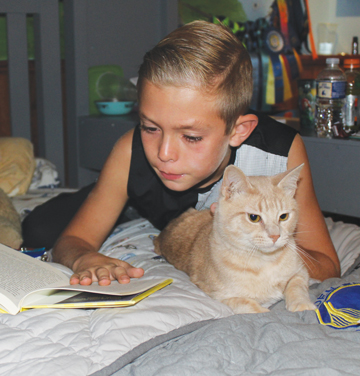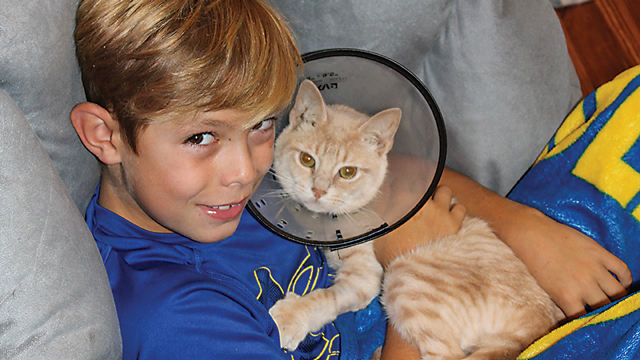In 2015, 5-year-old Zach Huff heard a story from his mom about a kitten at a shelter named Flash who was terminally ill. Zach understood that little Flash would have about two years to live – nowhere near the kitty average of fifteen years. Despite Flash’s prognosis and diagnosis of feline leukemia, Zach was determined to make the cat feel loved during its last years. He asked his mom to make Flash a part of their family.
Flash had been diagnosed with an infectious disease called feline leukemia virus (FeLV). FeLV is a highly contagious virus that can be passed cat-to-cat through saliva and a nursing mother’s milk. Although there is a vaccine available, the only course of action for a cat diagnosed with FeLV is supportive care for the remainder of the cat’s life. For cats like Flash who are FeLV positive, the likelihood of a shorter-than-average life, the restrictions on living with other cats, and the likelihood of extra medical care makes them much harder to adopt than any other shelter pet.
Flash passed away two short weeks before his second birthday. Zach’s mother Rachel said that even though they chose him knowing what would happen, letting go of Flash was the hardest thing she and her son had faced. In the aftermath, Zach made his mother promise to find another cat for them to help – “one just like Flash.”
 In honor of Flash, Zach and his mother Rachel developed a mini-rescue system that Zach calls Team Flash. Its sole purpose is to find and adopt FeLV-positive cats into their home, and to be a force for change in a world where FeLV cats have few options for rescue.
In honor of Flash, Zach and his mother Rachel developed a mini-rescue system that Zach calls Team Flash. Its sole purpose is to find and adopt FeLV-positive cats into their home, and to be a force for change in a world where FeLV cats have few options for rescue.
Recently, Team Flash received a picture of a scared, injured buff tabby cat who had tested positive for FeLV, and further medical examination showed that the kitty in question, Curry, had a broken pelvis and a fractured leg. The cat would need extensive treatment and a special home to give him the care and attention he needed to recover.
With the help of Richmond Animal League, Curry was transferred from an open-admission shelter to Team Flash. “Within seconds of meeting Zach, Curry was purring,” says Rachel.
Curry received several life-saving surgeries through Richmond Animal League, including a full leg amputation. A kitty who was already a little unique because of a disease became a one-of-a-kind wonder cat who runs, jumps, and plays just like his four-legged rescue friends. He’s living his best life as the newest member of Team Flash.
Rachel says that she and Zach are often asked why the family continues to adopt cats who have leukemia when they know how much shorter their lives may be. Zach is quick to respond. “How can you not?” As young as he is, Zach’s commitment to cats like Flash and Curry has taught him important life lessons of empathy and gratitude.
“Every day is a good day to rescue,” explains Rachel. “Whether it’s as an adopter or a foster – or a foster fail.” In animal rescue speak, a “foster fail” occurs when a foster parent ultimately adopts a foster pet. Rachel and Zach ultimately adopted Curry into their family officially in September, but there was no question that he’d found his home when they first met him in June.
Elizabeth Thomas, executive director of RAL, agrees that there is never a bad time to adopt a pet. There are always cats and dogs waiting at shelters around the region for humans who want to expand their families. “Curry wasn’t in the best shape when he joined Team Flash, but it was where he needed to be,” says Thomas.
As the holidays draw near, Thomas says it’s easy to see the value in coming to a shelter to look for a companion, whether it’s a cat or a dog or other types of fluffy or scaly friends.
At RAL, the Operation Silent Night initiative, which runs December 6 through 23, encourages the adoption or fostering of every animal at the shelter. During this time, shelter hours are extended and adoption fees are reduced to help families bring home a pet for the holidays. All pets are spayed or neutered, microchipped, and vaccinated before going to their new homes.
Families who want to foster can begin picking up their pets the morning of December 21. Animals can be returned to the shelter on December 26. As with long-term fosters, RAL provides food, litter, medicines, and veterinary care.
“No matter the time of year, there is no greater gift than being a part of RAL’s mission and providing a home for a pet in need,” says Thomas. “And while the dog or cat might seem like the needy one, often the family who finds the pet truly receives the greatest gift.”




